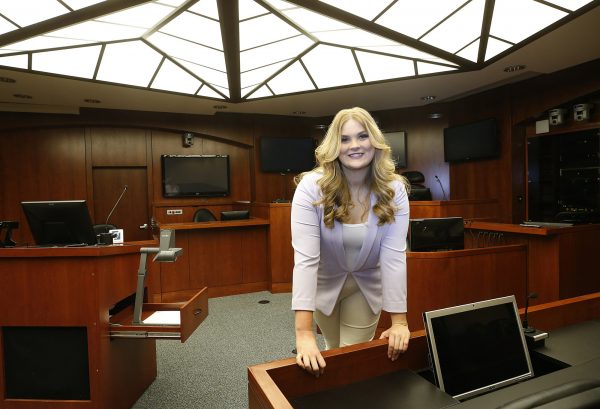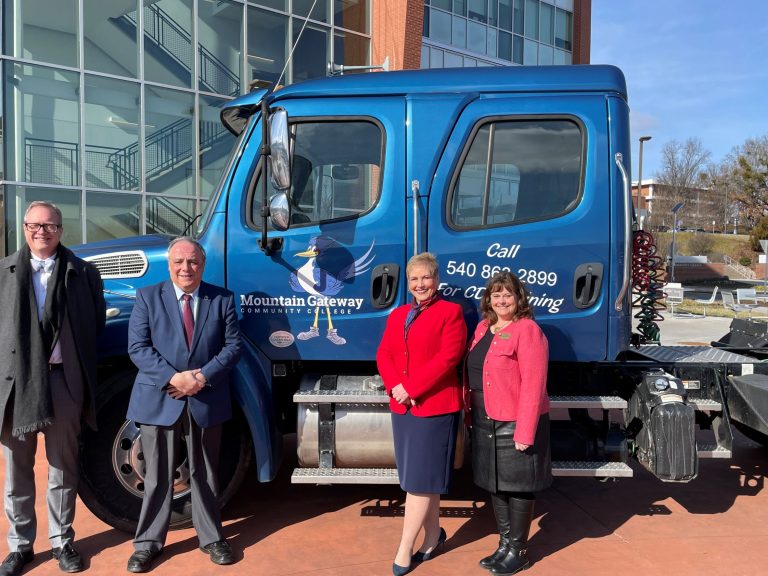
RICHMOND, Va. (AP) — When Hallie Hovey-Murray was in college, one of her sorority sisters made a passing comment about another girl: “Oh, she’s so socially awkward, she probably has autism.”
It was just a passing comment, but it stuck with Hallie.
She was on deadline for an online publication at Southern Methodist University and knew she had to address it.
“Hi, my name is Hallie and I have autism,” she wrote.
It was the first time she’d been open about her autism in college.
“I didn’t want to be judged because of it. I didn’t want people to look at me differently,” Hallie said. “Most of my friends didn’t even know until the whole school knew.”
She wrote that she had been diagnosed with autism when she was around age 10. She wrote about the challenges she faced, how she was told she wouldn’t graduate high school until she was 21 but how she wouldn’t allow autism to define her.
She wrote that she was in a sorority, the president of speech and debate, and headed to law school at the College of William & Mary in Williamsburg.
Her father sent her column to the Richmond Times-Dispatch where it ran as an op-ed.
The response was huge.
People were suddenly reaching out to her. She was asked to speak at schools. She was asked to speak at organizations. She realized that she could help people.
“It’s so important to me to spread awareness about the misrepresentations and the misconceptions people have about autism,” Hallie said.
Writing that column changed her life.
Growing up wasn’t easy for Hallie. She was different, and she didn’t know why.
She was smart and inquisitive and thought about everything, even in second grade, like when she asked her teacher, “Could God be a ‘she’ instead of ‘he’?”
But she couldn’t follow rules, couldn’t sit and color and went running out of the classroom when she got overwhelmed.
She acted out. She misbehaved. She was expelled from two schools.
She would ask her mom: “What’s wrong with me?”
Her family was determined to find out.
Over the next three years, Hallie bounced in and out of schools as her doctors failed her. First, she was diagnosed with Attention Deficit Hyperactive Disorder. Then Oppositional Defiance Disorder. The pills meant to help, hurt.
“It was like throwing gasoline on a fire,” said her father, Bill Murray.
Her mom, Jean Hovey, quit her job in health policy to home-school.
Hallie’s behavior got worse.
When she was about 10, she was hospitalized at the Virginia Treatment Center for Children, which is now part of the Children’s Hospital of Richmond at VCU.
It was a very scary time. Her parents were told that Hallie might need long-term care.
“I never doubted the nature of Hallie’s will,” her dad said. He was working in the governor’s office at the time and now works in energy policy. “I never worried about her being a successful adult. It was more like, ‘Can we just get her through the next three months?’”
But it was different for her mother.
“Oh, I worried,” Jean said. “I’d been a social worker. I was scared for her. I didn’t know what to do. I needed hope that she would get better.”
Finally, Hallie was tested and diagnosed with autism.
“And everything clicked,” Hallie said.
Women with autism are often misdiagnosed because autism looks and represents differently in women. Boys are four times more likely to be diagnosed than girls.
“It was like, ‘Oh, we’ve been completely wrong all these years.’ It would have been better to know at age 3, but better to know at age 11 than never,” her dad said.
Now, children are diagnosed as early as 2 years old.
“The earlier the intervention, the better the outcome,” said Dr. Norm Geller, one of the doctors who helped diagnose Hallie. “If we can understand the signs and symptoms, the outcome of overall life improves dramatically.”
Hallie’s doctors finally found the right medication and she went to therapy. With a lot of work, Hallie went back to school in the fifth grade in Henrico County.
Now 23, Hallie is finishing her last year in law school at William & Mary and competing for Miss Virginia.
She is the only contestant for Miss Virginia with autism, according to Dale Bradshaw, her representative at Miss Virginia.
Competing in beauty pageants has sharpened her poise and communication skills. In high school, she knew that she needed to work on her social skills and took theater classes that taught her how to read emotional cues.
Now, Hallie speaks at schools and organizations on a monthly basis.
Last year, she formed the One in 68 Foundation that offers SAT-prep classes and other workshops for students on the autism spectrum.
At her speaking engagements, people come up to her and say, “I think my daughter might have autism.”
“It’s important to me to show them there is a light at the end of the tunnel,” Hallie said.
“I missed out on a lot of education because people were so focused on the behavioral deficits,” she said. “But what people don’t realize is that when kids miss out on education, they’re not able to bounce back from that. That’s why it’s so important that whenever possible, kids with autism are mainstreamed in a school environment.
“Because otherwise they’re going to become adults who are dependent on the state, who don’t have the resources or skills to provide for themselves or interact with their peers,” she said. “Even though it’s really hard for the students on the spectrum in schools, it’s going to be even harder when they’re 21 and they haven’t developed the skills to interact with people.”
On a recent Saturday, Hallie spent the morning volunteering with a group of kids in their teens who have autism.
It’s called “Social Saturdays” and is held by the Richmond Autism Integration Network. The class helps kids with autism work on their social skills, like what to do when they get angry or how to fix a mistake.
“Once kids get past age 11 or 12, the services stop or are weaned away, especially in school situations,” said Catherine Pall, the program director.
Under state law, health insurers are only required to offer autism coverage for kids ages 2 to 10. Lawmakers are considering a bill from Del. Bob Thomas, R-Stafford, backed by House Speaker Kirk Cox, R-Colonial Heights, that would eliminate the age restriction.
Hallie brought her giant puppet, Gus the Goose, to visit the kids. Ventriloquism is her talent for the Miss Virginia pageant. She’s become adept at throwing her voice. And the kids at RAIN love the puppets.
One boy, John, 13, was so shy, he couldn’t ask Gus the Goose to sing his favorite song, “Row, Row, Row Your Boat.”
“Come on, John,” Catherine said. “Ask him.”
“Go on,” Hallie added. “You can ask him. We know it’s your favorite song.”
They were trying to teach John how to ask for what he wanted. But he couldn’t get the words out; possibly because a reporter and photographer were in the room.
He smiled and stared at Gus the Goose.
“What people forget is that autism is a developmental disability, it’s not a learning disability,” Hallie said.
Everyone with autism is different, she said.
“We’re not all nerdy guys who are good at math like Sheldon on the ‘Big Bang Theory,’” she said. “We come in all shapes and sizes.”
Hallie is finishing up her last semester at law school. When she’s done, she’d like to do some pro bono work related to school accommodations for kids with disabilities.
“I hope to have a paradigm shift to see these students as the bright, unique, amazing individuals that they are. These kids have unique challenges that every other child does, too. It’s important to recognize they aren’t any less worthy of having equal opportunities,” she said.
In the meantime, she’s going to wrap up her studies, compete for Miss Virginia in June and keep using her voice.



